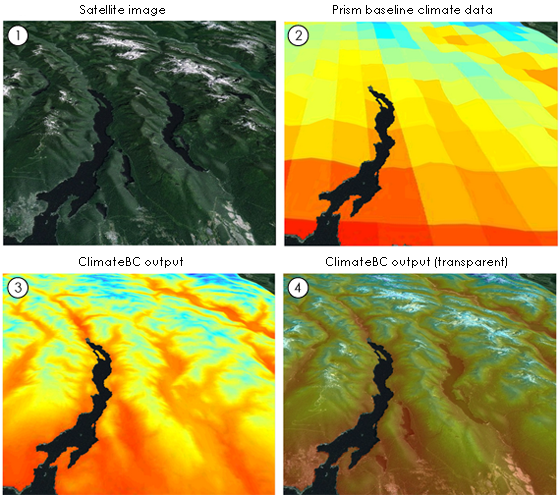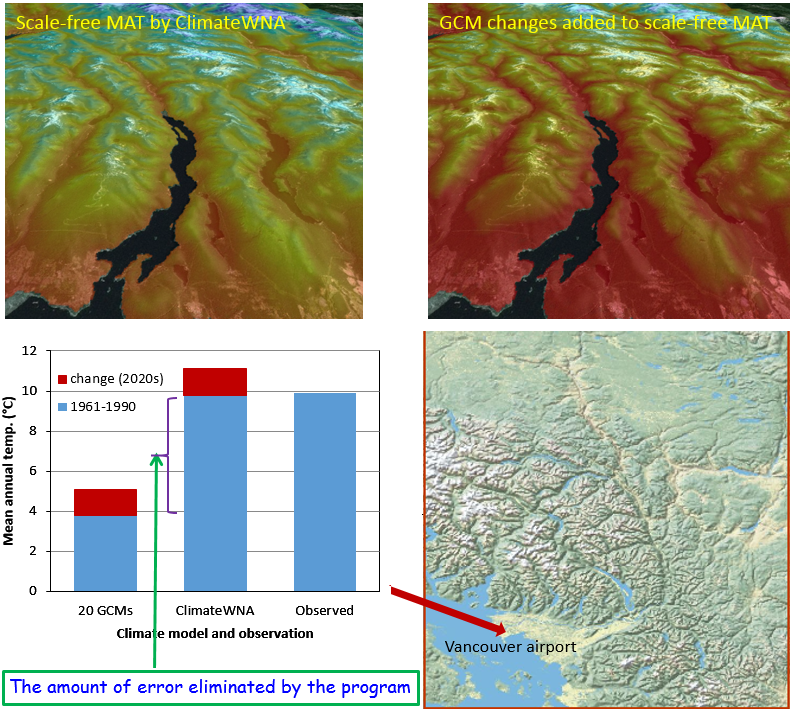ClimateBC/NA
 A program to generate high-resolution climate data for climate change studies and applications in British Columbia and western North America
A program to generate high-resolution climate data for climate change studies and applications in British Columbia and western North America
ClimateBC and ClimateNA utilize historical weather station data and global circulation model regional predictions to project future seasonal and annual climate variables in BC, western North America and entire North America. The programs extract and downscale PRISM (Daly et al. 2008) and ANUSPLIN (Hutchinson 1991) generated monthly data (2.5 x 2.5 arcmin) for the reference period (1961-1990), and calculate seasonal and annual climate variables for specific locations based on latitude, longitude and elevation (optional). The programs also downscale and integrates historical (1901-2013) (Mitchell and Jones 2005) and future climate data sets (2020s, 2050s and 2080s) generated by various global circulation models from IPCC AR5. The output includes both directly calculated and derived climate variables. There are 23 annual, 56 seasonal and 168 monthly climate variables. Methodologies are described in Wang et al. (2016).
The programs use a combination of bilinear interpolation and elevation adjustment to downscale the baseline climate data (1961-1990 normals) into scale-free point data. The elevation adjustment is achieved through a dynamic local regression function developed individually for each monthly climate variable in the baseline dataset. The effect of the downscaling is illustrated below:

Effect of downscaling on the baseline data
For historical and future climate data, the downscaling is achieved through a delta approach by adding anomalies of historical years or future periods to the scale-free baseline data generated at run-time by the programs. With this approach, the errors associated with the baseline period in the historical and future climate data are substantially reduced (Wang et al. 2016).
All the programs are freely available in a stand-alone desktop version or Google Map based web-version. The desktop versions allow users to generate data for more than one location at a time, which can be done using input coordinate files for a period or a time series. The web-based versions are designed for periodic users or those with program installation restrictions on their computers.
The web-based version of Climate BC also serves as an interactive platform to visualize (and download) spatial climate data over top of ecosystem classification and forest tree species bioclimate envelopes for British Columbia.
Feature articles:
“ClimateBC; modeling climates in BC forest ecosystems“, Forest Genetics Council Annual Report 2011-2012 (see page 14 in the PDF report).
“Climate-based seed transfer“, Forest Genetics Council Annual Report 2012-2013 (see page 15 in the PDF report).
Funding: Forest Genetics Council of BC, the BC Ministry of Forests, Lands and Natural Resource Operations, NSERC Strategic Grant, BIOCAP Canada Foundation, NSERC Industry Chair.
Participants: [ Wang | Hamann | Spittlehouse | Aitken ]
REFERENCES
Wang, T., A. Hamann, D. Spittlehouse and C. Carroll, 2016. “Locally Downscaled and Spatially Customizable Climate Data for Historical and Future Periods for North America.” PLoS ONE 11(6): e0156720.
Wang, T., Hamann, A., Spittlehouse, D., and Murdock, T. N. 2012. ClimateWNA – High-resolution spatial climate data for western North America. Journal of Applied Meteorology and Climatology 61: 16-29.
Wang, T., Hamann, A., Spittlehouse, D., and Aitken, S. N. 2006. Development of scale-free climate data for western Canada for use in resource management.. International Journal of Climatology 26: 383-397.
Hamann, A. and Wang, T. 2005. Models of climatic normals for genecology and climate change studies in British Columbia. Agricultural and Forest Meteorology 128: 211-221.
Daly. C., Gibson. W.P., Taylor, G.H., Johnson, G.L., Pasteris, P. 2002. A knowledge-based approach to the statistical mapping of climate. Climate Research, 22:99-113.
Mitchell, T.D. and Jones, P.D. 2005. An improved method of constructing a database of monthly climate observations and associated high-resolution grids. International Journal of Climatology, 25, 693-712.
Mbogga, M., A. Hamann, and T. Wang. 2009. Historical and projected climate data for natural resource management in western Canada. Agricultural and Forest Meteorology 149:881-890.

